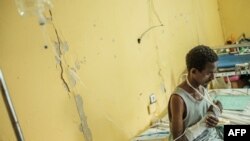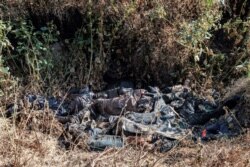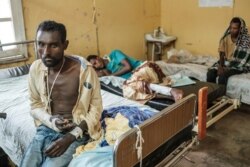Ethiopia’s government-appointed human rights commission has accused a youth group in the rebellious Tigray region of carrying out “an atrocious massacre” of hundreds of civilians, aided by Tigrayan security forces.
The Ethiopian Human Rights Commission on Tuesday issued a preliminary report alleging at least 600 people were killed in the Tigray region town of Mai-Kadra on November 9.
From Nov. 14-19, @EthioHRC deployed experts to #Ethiopia's Maikadra to carry out an investigation.
— Ethiopian Human Rights Commission (@EthioHRC) November 24, 2020
The probe finds atrocity crimes which may amount to crimes against humanity & war crimes were committed by ‘Samri’ group, aided & abetted by then-local admin, police & militia pic.twitter.com/IqMfmKzA7N
It said a group of youths informally known as Samri targeted ethnic Amhara and Welkait men, “beating them with sticks, stabbing them with knives, machetes and hatchets and strangling them with ropes.”
The commission suggested the death toll could be higher because some bodies could be in the farm fields surrounding the town.
The youths were “aided and abetted” by local militia and police, before fleeing from the advancing Ethiopian National Defense Force, the commission charged.
“Just before they retreated and left the area, it has now become very clear that they have carefully planned and executed quite an atrocious massacre against the civilians, which targeted people on the basis of ethnic identity,” Daniel Bekele, the chief commissioner, told VOA in a phone interview Tuesday.
Bekele called it “an atrocity crime executed in a very terrible way, which may amount to crimes against humanity or even a war crime.”
The Tigray People’s Liberation Front (TPLF), the Tigray region’s ruling party, did not immediately comment on the commission’s report, though it previously has denied involvement in the Mai-Kadra killings. Interrupted phone and internet connections in Tigray also make it difficult for journalists to independently verify information.
An official with the Tigray Regional State Communication Bureau, Hadush Kassu, has disputed accounts of ethnically targeted violence.
"They create this false story to continue the genocide against the people of Tigray,” he told VOA in an interview November 11. “The Tigray Special Forces do not have a culture of ethnic violence.”
Like the Ethiopian Human Rights Commission, Amnesty International has reported that “scores, and likely hundreds, of people were stabbed or hacked to death” in Mai-Kadra on the night of November 9. Amnesty researchers spoke to witnesses and “examined and digitally verified gruesome photographs and videos of bodies strewn across the town or being carried away on stretchers,” the rights group said.
The victims primarily were day laborers returning from working in the surrounding fields of maize (corn) and sesame, said Haimanot Ashenafi, a researcher on the Ethiopian Human Rights Commission’s emergency response team.
She was among commission investigators who arrived five days after the attacks, finding “debris all over, houses destroyed,” and evidence of lives lost.
“We visited a mass grave” at the Abune Aregawi Ethiopian Orthodox Tewahdo Church, Ashenafi said, speaking by phone Wednesday from Addis Ababa, the Ethiopian capital. “Too many bodies. Even the burials were not done properly. The church is disturbed by the smell.”
According to local accounts, one of the first victims was a soldier, an ethnic Amhara who refused to take up arms against fellow Amharas, Ashenafi said. Other militia members “shot him, threw his body into his residence and set him on fire,” the researcher said, saying she had spoken with the man’s widow and neighbors.
Ashenafi said the attackers concentrated on non-Tigrayan adult males in their prime, sparing the elderly, women and children.
“Two Tigrayans even escorted an old man, an ethnic Amhara, to a church” for his safety, she recounted. “They stabbed his hand but allowed him to survive.”
According to the commission’s preliminary report, attacks in Mai-Kandra continued through the night.
But Ashenafi said witnesses and survivors also related stories of humanity and heroism.
An ethnic Tigrayan woman cited in the report “saved 13 ethnic Amharas. She hid them in her house” and later escorted them to temporary shelter on a large farm, Ashenafi said.
Another Tigray woman suffered machete wounds on her hands as she tried to rescue a man who had been set on fire, Ashenafi said.
Such efforts “gave us hope, and we believe a light should be shed on them,” the researcher said.
In Twitter posts, Tibor Nagy, U.S. assistant secretary of state for African affairs, condemned what he called “the massacre of civilians in Mai-Kadra.” He also called for Ethiopian authorities “to conduct a thorough investigation.”
We urge the Ethiopian authorities to conduct a thorough investigation into this massacre and to bring those responsible to justice in accordance with the rule of law.
— Tibor Nagy (@AsstSecStateAF) November 13, 2020
(This report originated in VOA’s Africa Division, with Tsion Girma contributing from VOA’s Horn Service.)







